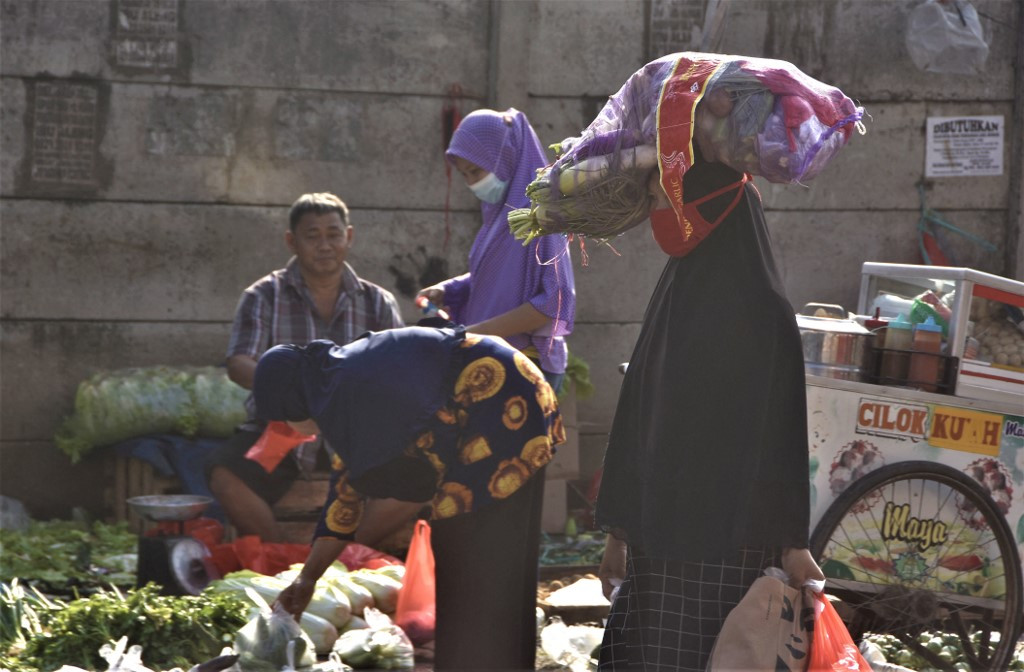Govt to double down on cooking oil prices
During a market visit, the trade minister vowed to strictly enforce a cooking oil price cap and raise the domestic market obligation for crude palm oil producers.
Change Size

T
he government has announced it will strengthen enforcement of the price ceiling on cooking oil after finding that the staple commodity was being sold above the cap in many places.
During a visit to the Kebayoran Lama Market in South Jakarta on Wednesday, Trade Minister Muhammad Lutfi said no seller there was complying with the price ceiling. Instead, they had raised prices to make gains, he alleged, in a practice that was common at traditional markets.
Breaches of the price ceiling occurred in part as a result of speculation among sellers about a plan by the government to scrap the price cap, according to Lutfi. Apparently seeking to dispel such speculation, the minister said the price cap would remain in place for no less than a year.
“We are still waiting for prices to come down, and I will involve law enforcement officers to make sure the price ceiling applies at both [supermarkets] and traditional markets,” Lutfi told reporters at the market.
Cooking oil prices surged in the months ahead of the introduction of the price ceiling as prices of crude palm oil (CPO), of which Indonesia is a leading producer and exporter, rose on the back of rising demand as the global economy recovered from the COVID-19 pandemic.
The price of bulk cooking oil sold at traditional markets in Jakarta, for example, reached Rp 18,300 (US$1.27) per liter in late January, Trade Ministry data show. While it fell to Rp 15,850 per liter on March 8, it remains far above the cap.
The government set the price cap at Rp 11,500 per liter for bulk cooking oil, Rp 13,500 for cooking oil with simple packaging and Rp 14,000 per liter for cooking oil sold in premium packaging.
Read also: Inflation eases in February as cooking oil price cools
Some provinces recorded even higher prices, such as Rp 20,850 per liter in North Maluku, Rp 19,300 in Lampung and Rp 19,150 in West Kalimantan.
Even in Riau and Central Kalimantan, the country’s top palm-oil-producing provinces, the price was far above the price ceiling at Rp 16,250 and Rp 18,000 per liter, respectively.
In late January, the government issued a domestic market obligation (DMO) that requires palm oil producers to redirect 20 percent of their intended export volumes to the home market. The Trade Ministry has also set price caps to keep those commodities affordable.
As of March 8, DMO supplies of refined, bleached and deodorized (RBD) palm olein and CPO stood at 573,890 tons, the Trade Ministry has reported. This figure is equivalent to 20.7 percent of Indonesia's exports of CPO and CPO derivatives.
Lutfi said the government was planning to issue a regulation on Wednesday to raise the DMO quota to 30 from 20 percent starting on Thursday in a policy that would stay in place for at least six months.
Between Feb. 14 and March 8, the government distributed 415,787 tons of both bulk and packaged cooking oil from the DMO supplies to at least 356 cities and regencies nationwide.
Of the 38 producers involved in the distribution, consumer goods manufacturer Wilmar Group topped the list. PT Bina Karya Prima (BKP), which sells the cooking oil brand Tropical, was the top distributor.
Hoarding, wholesaling at prices above the price caps and smuggling to export may have prevented the DMO policy from bringing down cooking oil prices as intended, according to the minister.
Arief Prasetyo Adi, who heads the Food Security Agency at the Agriculture Ministry, said authorities would install banners at markets to display the correct cooking oil prices, hoping that would deter sellers from raising the prices above the cap.
“We hope stocks and prices will stabilize going forward, and leading up to [Ramadan] and [Idul Fitri],” said Arief.
Faisal Rachman, economist at publicly listed state-owned Bank Mandiri, said raising the DMO to 30 percent was the right move amid the surge in demand leading up to Ramadan.
"The government must reaffirm that the price ceiling will always apply, so there is no speculation that prices will abruptly increase," Faisal told The Jakarta Post in a text message on Wednesday. "Oversight at the distributor level is also crucial."
Indonesian Muslims are set to observe a month of fasting in April and Idul Fitri in early May. Food and beverage prices usually rise during this time of year, sending overall inflation up.









